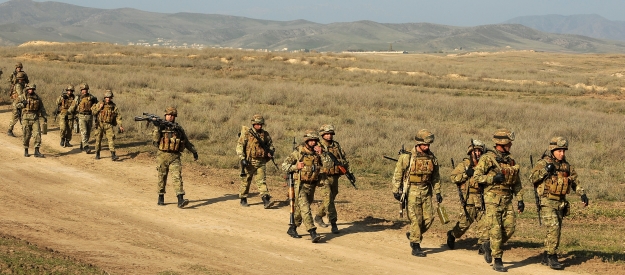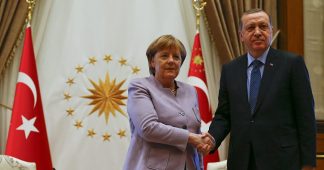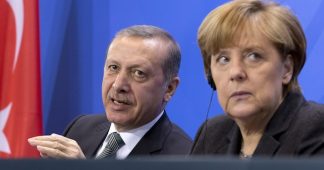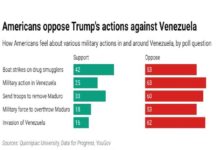German Chancellor’s recon mission: Merkel inspected potential NATO members in the South Caucasus
28 Aug, 2018
The chancellor signed several bilateral agreements, and statements were made concerning future relations between the South Caucasus nations and Europe.
Many Western and Russian experts agree that Chancellor Merkel was mostly interested in assessing the Southern Gas Corridor project when she visited the South Caucasus. It means that in the near future, the European Union is planning to organize new gas supply routes, bypassing Russia.
But there is reason to believe that this doesn’t fully define the events surrounding the chancellor’s visit. The head of the leading European state probably wanted to see with her own eyes (as we know, personal experience is the most important thing for a politician) the region’s geopolitical prospects
First of all, we should view the results of Angela Merkel’s trip from the geopolitical and politico-military angle, as economic concerns would be secondary in this case. Let’s look at the agreements that Angela Merkel signed with Georgia, for example: clearly, economics was not her top priority during the trip to the South Caucasus. All the contracts amount to €193 million, which is nothing.
According to one agreement, €150 million will be spent on building an underground gas storage facility in Georgia. Another contract has to do with water supply and sanitation programs in the Adjara region. Just to give you an idea, the cost for the gas storage facility would not quite be enough to buy two F-35 fighter jets (fifth-generation US combat aircraft), though you could buy two modern battle tank squadrons with this amount of money. So this visit had little economic value. Merkel’s goal surely wasn’t simply to improve the water supply and sanitation in the Adjara region.
First and foremost, her visit should be viewed as a geopolitical sounding out mission. If anything, it is their geopolitical value that has drastically gone up following the collapse of the Soviet Union.
Currently, Georgia and Azerbaijan are essentially geopolitical corks in the potentially enormous bottle full of bountiful treasures in the strategic region of Central Asia and other countries further to the east. Tbilisi and Baku are supposed to ensure access to the previously isolated area and serve as major transit countries for trade routes and oil and gas pipelines. Armenia is perceived to be somewhat off high street and is relegated to the role of South Caucasus side street.
The recently signed treaty on the status of the Caspian Sea is another step forward that could soon see Azerbaijan and Georgia emerging as important links in the transit route. According to the new convention, there are no longer any significant obstacles for trans-Caspian pipelines to be laid along its seabed. All of this could bring about a dramatic shift in the geopolitical landscape in the South Caucasus and the value of future transit nations.
However, new massive projects require military and political stability. Without it, no matter how geopolitically appealing they look, neither Georgia nor Azerbaijan nor Armenia are likely to be awarded the transit role in a trade that would bring the riches of Central Asia and the Far East to the EU.
The truth is, the region Zbigniew Brzezinski called the ‘Eurasian Balkans’ is a place of several frozen conflicts that could reignite at any time. There is a certain instability in Central Asia, too, but the main division lines lie between Georgia and South Ossetia and Abkhazia, and between Armenia and Azerbaijan. It’s unlikely that the opposing nations will manage to resolve these conflicts through negotiations or mutual concessions any time soon.
Some of them cannot be solved even by military means. For instance, Georgia will never venture to regain its territorial integrity on its own as that may possibly lead to another military conflict with Russia and yet another humiliating defeat for Tbilisi. And this time around it will be highly likely to end with catastrophic consequences.
As for Azerbaijan, its rapid economic growth and military build-up could possibly allow Baku to solve the problem of Nagorno-Karabakh by the use of force in the not-too-distant future. Azerbaijan’s potential (including its population) is rising year after year, while Armenia cannot boast any significant population growth. Quite on the contrary, the country has lately been manifesting clear signs of population decline.
Nevertheless, the West by no means wants to see the South Caucasus go up in flames in military conflicts and political-military anarchy. This simply runs counter to its core interests.
There is only one way to stay in control of this region and ensure relative peace, and that is to incorporate Georgia, Armenia, and Azerbaijan into NATO and then deploy certain elements of NATO’s military infrastructure in the South Caucasus.
On the one hand, that scenario seems to be quite unlikely for Russian politicians and strategists. On the other hand, back in the day, the inclusion of Baltic States in NATO was also considered absolutely impossible by many of Russian politicians. And yet it happened, and happened fast.
There is no doubt that in terms of military capabilities, the incorporation of, say, Georgia into NATO will not reinforce the alliance but rather undermine it. Even major investments into Georgia’s military capabilities will not lead to the creation of a truly combat-capable army or navy. The outcomes of the most recent conflicts that involved Georgia are a very compelling testimony to that fact.
However, Georgia’s geopolitical importance overweighs everything else. Hypothetically, NATO military forces could be deployed in Georgia to change the balance of power in the region in favor of the West, providing much-needed stability.
During her South Caucasus tour, Angela Merkel said she couldn’t see “Georgia’s prompt accession to NATO,” but this could merely be, using military terms, a part of the deception operation. The importance of Georgia as a geopolitical cork is so great that this country could be admitted into NATO even with its territorial disputes unresolved.
Azerbaijan, as one of the key countries in the South Caucasus, is equally important to NATO. Without Azerbaijan, there won’t be any fully functioning transit route in the region.
These geopolitical aspirations of the Western countries have only one purpose, and that is to diminish Russia’s weight and influence in the South Caucasus.
It’s highly probable that Merkel’s main goal during her South Caucasus tour was for her, as the leader of united Europe, to personally evaluate whether Georgia and Azerbaijan (and Armenia, eventually, no matter how unbelievable this seems for us in Russia) could actually join NATO.
So, having observed the Russian military base in South Ossetia through binoculars (no matter how much we ridicule this), Merkel might actually decide to admit Georgia to NATO in the near future without South Ossetia and Abkhazia. As for Georgia’s territorial problems, it will be up to future generations of politicians and military leaders to fix them.
Mikhail Khodarenok, military commentator for Gazeta.ru
Bio:
Mikhail Khodarenok is a retired colonel. He graduated from the Minsk Higher Engineering School of Anti-Aircraft Missile Defense (1976) and the Command Academy of the Air Defense Forces (1986).
Commanding officer of the S-75 AA missile battalion (1980-1983).
Deputy commanding officer of a SAM regiment (1986-1988).
Senior officer at the High Command of the Air Defense Forces (1988–1992).
Officer at the main operational directorate of the General Staff of the Armed Forces(1992–2000).
Graduated from the Military Academy of the General Staff of the Armed Forces of the Russian Federation (1998).
Worked as an analyst at Nezavisimaya Gazeta (2000-2003) and editor-in-chief of Voyenno-Promyshlennyi Kuriyer (2010-2015).
Published at https://www.rt.com/op-ed/437039-angela-merkel-georgia-azerbaijan/











